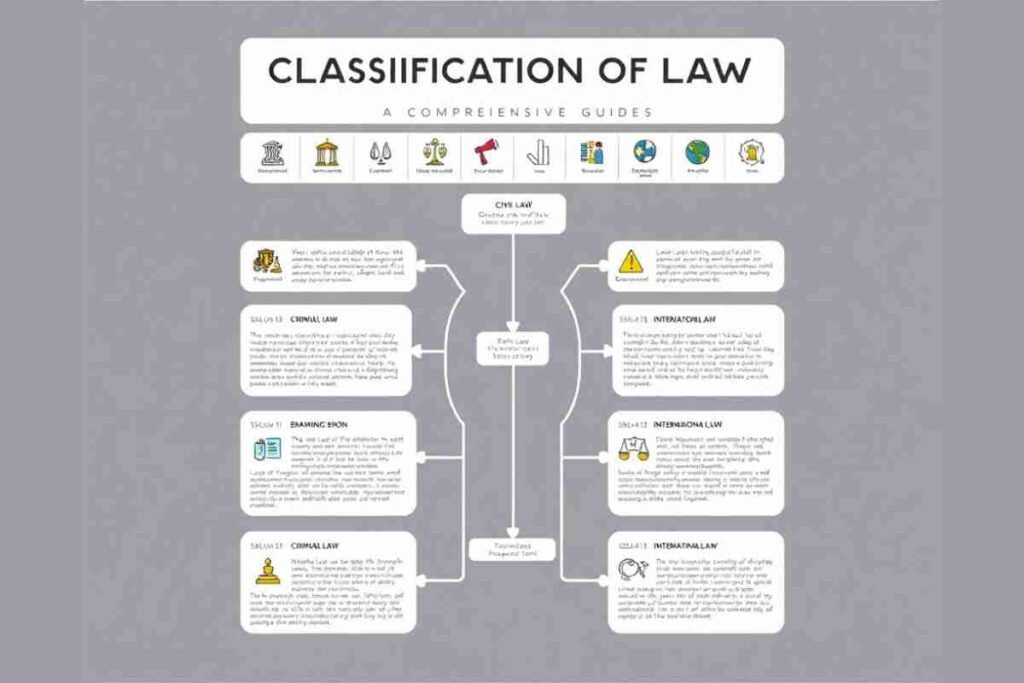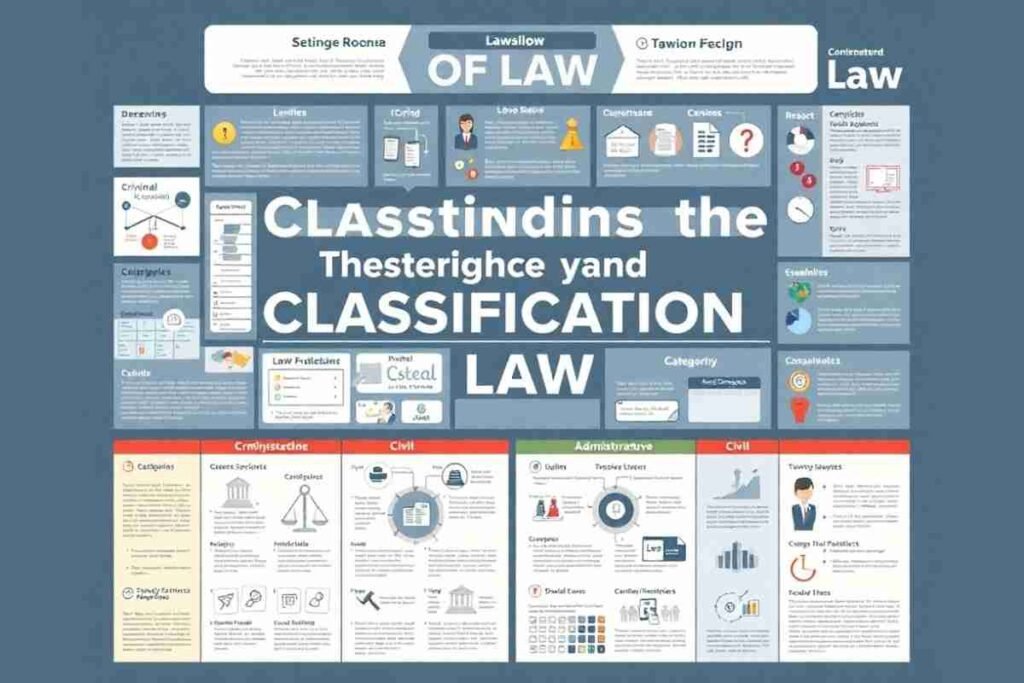Law is a critical aspect of every society, providing a framework for governing behaviors, resolving disputes, and ensuring justice.
To better understand this vast field, it is important to know the classification of law, which divides legal principles into various categories.
This classification helps in understanding its application across different areas such as business law, administrative law, and property law under Hindu law.
What is the Classification of Law?

The classification of law refers to the process of grouping legal rules into different categories based on certain characteristics or functions.
It allows us to study law more effectively by breaking it down into manageable and specialized areas, making complex concepts easier to understand and apply.
By understanding this classification, it becomes easier to identify which law applies in different situations, whether it’s for a business contract or an administrative action.
Major Classifications of Law
The classification of law is often discussed under several broad categories. Here’s a breakdown of the most common types:
Public Law vs. Private Law
Public law regulates the relationship between individuals and the state. It covers areas such as criminal law, administrative law, and constitutional law. Private law, on the other hand, deals with relationships between private individuals or organizations, such as in contract law, property law, and tort law.
Civil Law vs. Criminal Law
Civil law focuses on resolving disputes between individuals or organizations, such as personal injury claims or contract disputes. Criminal law deals with actions that are considered offenses against society, such as theft, murder, or fraud.
Classification of Law in Jurisprudence
In jurisprudence, or the philosophy of law, classifications are used to understand legal systems from a theoretical perspective. Scholars of jurisprudence often categorize law based on different schools of thought. These include:
- Natural Law: Based on the belief that certain rights are inherent and should be protected by law.
- Positive Law: The law created by the state, society, or a governing body.
- Legal Realism: Focuses on the real-world application of laws, rather than abstract principles.
The classification of law in jurisprudence helps in understanding how legal theories influence the practice of law in real life.
Classification of Contract in Business Law
In business law, contracts are fundamental for transactions and agreements. The classification of contract in business law refers to the different types of contracts based on their structure, performance, and purpose. Contracts can be classified as:
- Bilateral and Unilateral Contracts: A bilateral contract involves an agreement between two parties, while a unilateral contract involves one party making a promise in exchange for a specific act from the other party.
- Express and Implied Contracts: Express contracts are clearly stated, either in writing or verbally, while implied contracts are inferred by actions or conduct.
- Executed and Executory Contracts: Executed contracts are those where both parties have fulfilled their obligations, while executory contracts are those where one or both parties still have duties to perform.
Understanding the classification of contract in business law is essential for businesses to ensure their agreements are enforceable and clear.
Classification of Administrative Law
Administrative law governs the activities of government agencies. It sets out the regulations and procedures that agencies must follow in enforcing laws and making decisions. The classification of administrative law can be divided into:
- Regulatory Law: Deals with rules that govern specific industries and sectors, like the environment or telecommunications.
- Adjudicatory Law: Involves the procedures by which administrative agencies resolve disputes, such as hearings and decisions.
- Advisory Law: Covers the advisory roles of agencies that provide guidance without making binding decisions.
The classification of administrative law is crucial for maintaining transparency and accountability in the functioning of government institutions.
Classification of Property Under Hindu Law
Hindu law has a distinct approach to property, where property is classified into two broad categories:
- Separate Property: This refers to property owned individually, not subject to the common pool of family assets.
- Joint Family Property: This property is owned collectively by the family, with the share of each member defined by customary law or statutes.
The classification of property under Hindu law is essential for understanding inheritance rights and family asset distribution.
The Importance of Law Classifications

Understanding the classification of law is critical for several reasons:
- Clarity and Precision: Classifying laws helps in identifying which laws are applicable to specific situations, making legal processes more predictable.
- Better Legal Practice: Lawyers and judges rely on legal classifications to apply the correct rules and principles in different cases.
- Streamlining Legal Education: It helps students and practitioners of law to specialize in particular fields of law, making their study and practice more structured.
Conclusion
The classification of law is a vital and fundamental concept in understanding how laws govern society effectively.
From the application of business contracts to the functioning of administrative bodies and even property rights in Hindu law, each classification serves a purpose in maintaining order and justice.
Whether you are a student, legal professional, or simply a curious reader, grasping the various branches and classifications of law enhances your understanding of the legal landscape.
As we’ve discussed, classifications like the classification of contract in business law, classification of administrative law, and classification of property under Hindu law are just a few examples of how law is organized and applied in different contexts.
To dive deeper, resources like government websites, legal blogs, and textbooks are excellent for further learning.
FAQs
What is the main purpose of law classifications?
Classifications help break down legal rules into specialized categories, making it easier to understand and apply laws in various situations.
How does public law differ from private law?
Public law governs the relationship between the state and individuals, while private law focuses on relationships between private parties or organizations.
What are civil and criminal laws?
Civil laws resolve disputes between individuals or entities, while criminal laws address offenses that harm society and are punishable by the state.
What is the significance of contracts in business?
Contracts are essential for formalizing agreements between parties, ensuring legal protection and clear expectations in business transactions.
How does administrative law work in government?
Administrative law regulates the activities of government agencies, outlining how they create, enforce, and review rules and regulations.
What are the two main types of property in Hindu law?
Property is categorized as either separate, owned individually, or joint, shared collectively by family members under customary or statutory law.
Why is classification important in the study of law?
It aids in simplifying complex legal concepts, helping students and professionals apply the right legal principles to specific issues.
How does business law ensure fair practices?
Business law sets out rules and guidelines that regulate commercial activities, preventing unfair practices and ensuring transparency in transactions.







